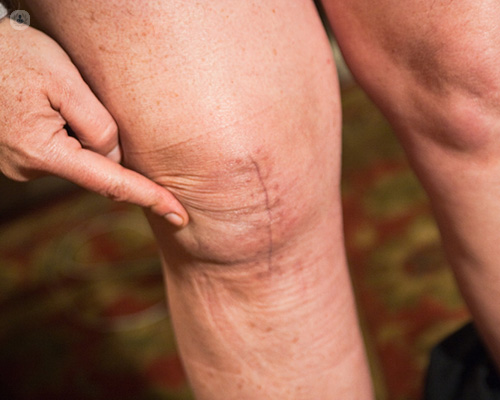Knee replacement surgery: are there any risks or complications?
Written by:Total knee replacement (TKR) surgery is a popular and effective treatment for patients suffering from disabling and severe knee arthritis. Often life-changing surgery, a total knee replacement can significantly improve knee pain, function and quality of life. However, for some patients having TKR surgery, the outcomes are not as positive, and there are many potential negatives of knee replacement surgery. Mr Henry Atkinson, a leading orthopaedic surgeon, reviews the possible risks and complications involved in knee replacement surgery.

Knee replacement surgery is often used as a way to treat end-stage knee osteoarthritis; a common condition which occurs with increasing age, and typically causes pain, loss of function and reduced mobility. In England and Wales, approximately 100,000 primary TKRs are implanted every year, and whilst many of these prove successful, this is not the case for all. Around 14-53% of TKR patients have some level of persisting knee pain, 7-50% of TKR patients report poor knee function, and mean published dissatisfaction rates range from between 15% and 30%. This therefore highlights the importance of patient education, counselling and the consenting process when treating conditions like knee osteoarthritis, such that realistic expectations can be met.
The following are the main potential risks associated with TKRs and each should be discussed with your treating doctor:
Infection:
Despite the elaborate routine precautions and preoperative antibiotics being given to patients, a deep infection can still occur in patients, either early on following surgery, or sometimes in the years following. Treating an infected TKR is complex, with surgery required and more inpatient time than a standard revision TKR.
DVT and pulmonary embolism (PE):
Although thromboprophylaxis is typically given to TKR patients and leg stockings are worn for up to six weeks, DVT and PE (blood clots) can still occur, which can be fatal.
Wound healing complications:
Sometimes the surgical wound fails to heal properly, requiring further surgery. There is a greater risk of this in patients who are malnourished, the obese, in smokers and those with vascular disease.
Scar pain and numbness:
For some, numbness or pain around the scar can occur, which on occasion will require further surgery.
Vascular injury:
Although these are rare following TKR surgery, injuries to the arteries at the back of knee can occur. This can result in possible leg amputation.
Intra-operative fractures:
These can occur during surgery, but they are most common in women and patients with lower bone density. However, often these are very small cracks or fissures which do not require treatment.
Amputation:
Although the risk of amputation is very low in primary TKR patients, it may be necessary if there is an uncontrollable deep infection, chronic pain, severe bone loss or vascular complications.
Bleeding or transfusion reactions:
Although some blood loss is expected during TKR surgery, some patients will require a blood transfusion. Blood transfusion in the UK is very safe, with extremely low rates of infection.
Tourniquet problems:
A tourniquet is sometimes used during TKR surgery because it can help to keep the operative field dry and aids cementing of the implants, however, it has been found that TKRs performed without a tourniquet have fewer thromboembolic events. Additionally, nerve injury (thigh or leg pain, numbess and weakness) can result from tourniquet use.
Clicking and grinding noises:
A common occurrence following TKR surgery is hearing grinding or clicking noises from their operated knees. Such patients are also more likely to report functional limitations, a limp, swelling and stiffness.
Patellar clunk syndrome:
This is the painful catching or grinding of the kneecap when the knee moves from a flexed position to an extended one. This is caused by a fibrous nodule that forms on the underside of the quadriceps tendon. However, this problem can be successfully treated arthroscopically.
Stiffness (arthrofibrosis):
This affects 8-60% of TKR patients, causing stiffness and a reduced range of knee motion, resulting in reduced satisfaction in affected patients. If knee flexion following surgery is less than 90°, then manipulation of the knee under anaesthesia is recommended.
Instability and dislocation:
Clinical instability affects around 1-2% of TKR patients. This is where the knee feels wobbly. This can occur following surgery, either acutely or over the long-term and either when the leg is fully extended or just partially flexed such as when climbing stairs. Dislocation is the most extreme form of instability. Instability usually requires surgical treatment.
Anaesthesia:
As with any surgery performed with general anaesthesia, there is a small risk of complications resulting from this, however, this risk is low.
Medical complications and death:
This is the case with any surgical procedure, however, this is low and increases with both age and operative time.
What other risks are there?
- Bilateral (both knees operated at the same time) TKR surgery carries twice the complication rates.
- Metal allergies to the implants.
- Implant malalignment due to the mismatch between the implant size and shape, and the patient anatomy.
- Implant failure (often caused by wear and tear and high-impact sports), however, in the UK a TKR should last between 15-20 years.
- Lower limb swelling (common for the six months following surgery).
- Skin discolouration (this goes away after 3-4 months).
Although TKR surgery is not a perfect, risk-free procedure to treat knee arthritis, it does actually provide good pain relief and functional improvements, and 80% of patients self-report good or excellent outcomes. Like most surgical procedures, there are continual technological advances and improvements being made.
If you are preparing to have knee replacement surgery, make an appointment with an expert to discuss your options and to get all the information you need.


